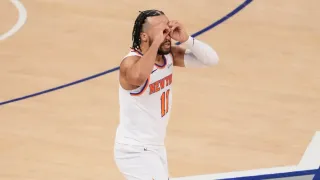July 17, 2023
With 'Under My Skin,' Writer/Director David O'Donnell Examines the Gender Binary with a Casting Twist
Kilian Melloy READ TIME: 8 MIN.
Writer-director David O'Donnell's debut feature, "Under My Skin," is the sort of film that contains multitudes. A little drama, a little rom-com, and very much a story about finding oneself when one doesn't fit into the gender binary, this little indie punches above its weight and does an admirable job on all counts.
The film is available on demand from Amazon Prime and on on Vudu.
But this isn't just another scrappy LGBTQ+ movie made for next to nothing. In a move that's been used to seldom in cinema that maybe less than a handful of other films have attempted anything like it, "Under My Skin" dives, in a cinematic sense, under the surface of its main character, Denny – the protagonist who's questioning their gender and, eventually, their relationship with Ryan (Alex Russell), the sweet-tempered, good-natured, and unquestionably hot young lawyer they've become involved with.
Being in an in-between place in many respects, Denny holds more than one image of themselves; this is depicted in the film through the use of four different actors – Liv Hewson, Chloe Freeman, Lex Ryan, and Bobbi Salvor Menuez, all of them non-binary – to show Denny's many aspects. Tough, playful, temperamental, sexy, shy... Denny's all those things and more, and the transitions they're going through are illustrated by sudden switches from one actor to another, even within the same scene. To Ryan, Denny always looks and sounds the same, while to the audience – and to Denny, as well – they might be a self-possessed redhead one minute and a Black woman with a sultry English accent the next.
Sprinkled through the film are moments that remind us of uncomfortable, even frightening, truths that women, be they trans or cisgender, as well as non-binary people encounter all too frequently: Unwanted, sometimes aggressive, attention from men who thoughtlessly expect anyone they find attractive to be keen on them in return.
That aspect of the movie came to the fore in O'Donnell's interview with EDGE, prompting him to share an anecdote from Cannes.
"I was with someone and we're talking, and this older producer – maybe in his late 50s – keeps on coming up and saying how beautiful she is. The girl was maybe 30, and it's like, that's very nice at first, but after about eight times, it's like, 'Okay, thank you, move along.' "
Where the story goes is, sadly, not surprising.
"This guy clearly had a few drinks," O'Donnell continues, noting that this was at "an industry-type event.
"This guy comes up and squeezes her ass right in front of me," the filmmaker relates, clearly still incensed. "I was furious, obviously, and in no uncertain terms told this guy to fuck off. Sometimes you think, 'Oh, it's 2023, we're through with that.' But this is a week ago. These entitled clowns are out there. I guess it's part of life, and not a good one."
If O'Donnell's film seems unusually perspicacious, and sensitive on multiple levels to its protagonist and her initially bewildered boyfriend, it's clearly because O'Donnell himself is perceptive, empathetic, and sensitive. What brings this film an extra sense of authenticity is that the story he's telling in "Under My Skin" is inspired, in large part, by events from his own life.
Read on to find out more.
EDGE: You drew from your own life to make this movie. To what degree?
David O'Donnell It's really my ex-partner, going back all the way to 2013. Them coming out as trans was an inspiration for the film. They were a producer on the film, so we ended up doing this film together.
EDGE: It's a fascinating choice that you make, that you've got four actors playing the main character, Denny.
David O'Donnell In a film, you're looking for something that works on multiple levels, and this seemed like a convention that was going to work on multiple levels. It seemed clear that [this casting choice] was going to achieve a number of things. For one, it brought multiple perspectives to the experience of being nonbinary. Raynen [O'Keefe], my producing partner, felt that that was a very strong point; it was going to allow us to cast more nonbinary actors in this meaty role. And yes, you've got this abstract depiction of transition. Raynen felt positive about that. There were multiple ways in which Denny's arc and that exploration of identity was going to [work].
[The use of multiple actors for the role of Denny] wasn't in the original script. When this concept was originally suggested by Raynen, it immediately seemed to be a very out of the box approach, but an interesting one. So then it became, "What is the grammar of how we do this? How do we set it up so that the audience understands what journey they're on? Where do the changes of actors take place?" We came up with that grammar, and it was essentially specific points in Danny's journey.
EDGE: When you were casting these four actors, did you intend for them to each reflect a certain mood or a facet of Denny at particular junctions?
David O'Donnell: On one hand, we wanted the different Dennys to bring their own perspective, their own experience, their own lens to the to the character. On the other hand, there were these different chapters that were being explored. When the film starts off, it's clear that Denny is exploring internally, but that exploration has not yet been crystallized. And then we go into the second chapter, when they're taking more action taking exploring in the real world and then they come out. So, yeah, there were these different chapters, and each of those chapters has a different flavor. But the different colors that the actors brought were also important.
EDGE: Why did you choose this story to be the one you tell for your feature film debut?
David O'Donnell It's a story that we felt passionate about. It was written a while ago, but it felt like a story that was right for the time. We shot it just before the pandemic, [did the post-production] in the pandemic, then we were on the festival circuit. But this is a story that comes from a place of love. The world tries to teach you to be harsh and hard, and I think this story was trying to reconnect and come back to a place of love.
EDGE: Denny is going through a process, but that process is a little hard on Ryan, because Danny's so literally changeable.
David O'Donnell They're coming from extremely different places. On the surface, it couldn't be more different. But that is part of the film, trying to go beyond superficial things and look for deeper insight. Denny is a fair way along on a journey and is going further – and Ryan is maybe earlier on the journey and is evolving in his way.
EDGE: There are times when it felt like Denny's really being mean to this poor guy. Did you worry at all that this was going to make Denny less sympathetic, and people were going to see Ryan as the hero of the piece?
David O'Donnell: Yeah, I think there's some complexity to Denny, but hopefully there's maybe some appreciation for what they're going through, as well. And again, different actors brought different flavors to the role. We wanted to try to give Denny some room to push back, to sort of fight for their space and also understand that they are going through something that is challenging.
EDGE: Do you have another feature in the works?
David O'Donnell I've got a couple of other features. One is an Australian crime drama, and then there's another indie, grounded sci fi that's in the works. So, there are different things, and we'll see what goes next. Hopefully, it won't be too long till we get the next thing up.
"Under My Skin" is available on demand from Amazon Prime and on on Vudu.






